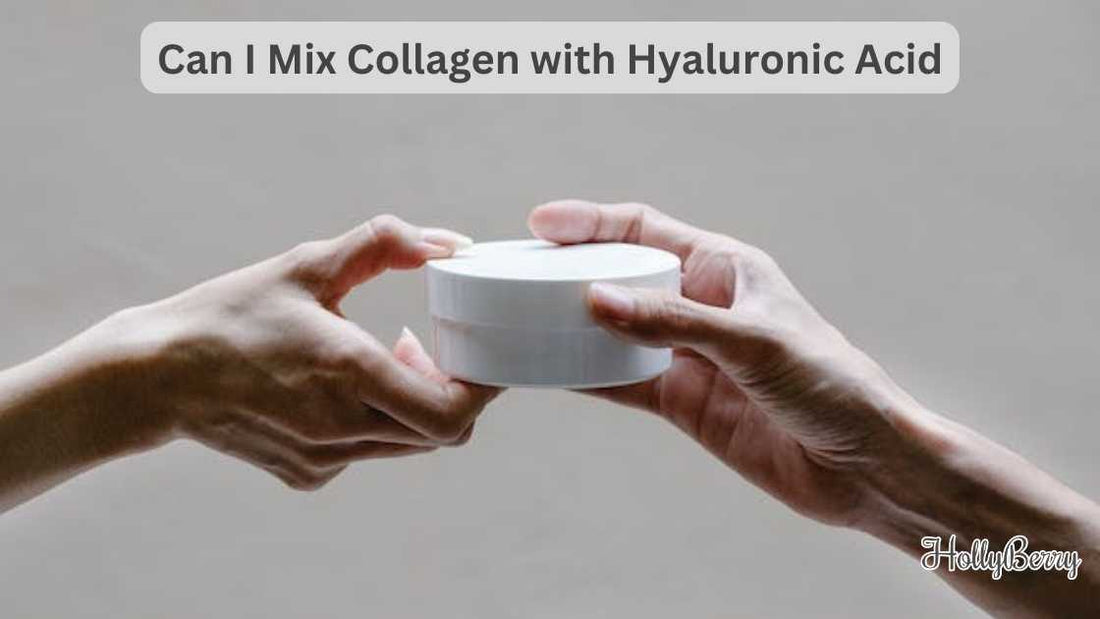
Can I Mix Collagen with Hyaluronic Acid
Share
Unveiling the Benefits for Skin Health

Collagen and hyaluronic acid are two substances widely recognised for their benefits in promoting skin health and anti-ageing effects.
Collagen is the most abundant protein in the body, providing essential structure and support for the skin, while hyaluronic acid is known for its remarkable ability to retain moisture.
Together, these components play a critical role in maintaining hydration, firmness, and elasticity of the skin, which are key factors in reducing the appearance of wrinkles and fine lines.
The idea of combining collagen with hyaluronic acid in skincare routines is gaining popularity due to the synergetic effects they may offer. The presence of hyaluronic acid has been found to aid in the stimulation of collagen production, leading to improved skin texture and resilience.
This integrative approach allows individuals to address multiple concerns associated with ageing skin effectively, enhancing both the structural integrity of the skin and its ability to retain hydration.
While research continues to support the mutual benefits of using collagen and hyaluronic acid together, it is important for consumers to understand how to incorporate these ingredients into their skincare regimen.
Products formulated with both collagen and hyaluronic acid can offer a multifaceted solution, targeting the underlying causes of ageing skin, beyond just the superficial symptoms.
By choosing the appropriate formulations and application methods, individuals may see a noticeable improvement in skin health and a reduction in the visible signs of ageing.
Understanding Collagen and Hyaluronic Acid
In the realm of skincare and joint health, collagen and hyaluronic acid play pivotal roles. Their collaborative application in supplements and skincare has been noted for enhancing the natural repair processes and hydration levels in various tissues.

Order our Hyaluronic acid products
Role of Collagen in Skin and Joint Health
Collagen is a protein that acts as a crucial building block for skin, tendons, ligaments, and cartilage. It provides structural support to connective tissue and is fundamental in maintaining skin elasticity and joint health.
As the body ages, collagen production declines, leading to a reduction in skin firmness and potentially contributing to joint pain and conditions such as arthritis.
Benefits of Hyaluronic Acid for Hydration and Aging
Hyaluronic acid serves as a natural humectant, meaning it draws and retains moisture, which is essential for skin hydration. Aside from its ability to hold substantial amounts of water, hyaluronic acid also contributes to anti-aging benefits by helping to reduce signs of skin aging.
Hyaluronic acid supplements and serums can aid in keeping the skin plump and hydrated while supporting tissue repair and wound healing.
Synergistic Effects on Skin and Tissue Repair
When used together, collagen and hyaluronic acid supplements enhance each other's effects on skin and tissue health.
While collagen works on providing structural integrity and repair, hyaluronic acid improves the overall moisture content within the skin and tissues. This combination results in a complementary approach to slowing down the aging process and aiding the body's natural healing mechanisms.
Incorporating Collagen and Hyaluronic Acid into Your Skincare Routine

Collagen and hyaluronic acid play pivotal roles in maintaining skin health and mitigating the effects of ageing. Through careful selection and application of skincare products, one can integrate these substances effectively into their daily skincare routine.
Choosing the Right Products for Your Skin Type
When selecting skincare products containing collagen or hyaluronic acid, it's crucial to consider one's skin type:
- Sensitive skin might benefit from serums that are formulated without potential irritants.
- Acne-prone skin can look for non-comedogenic products to avoid pore-clogging.
- Products containing vitamin C and antioxidants could be more beneficial for individuals hoping to protect and enhance skin texture.
How to Use Topicals and Supplements Effectively
To garner effective results, one should integrate collagen and hyaluronic acid thoughtfully into their routine:
- Begin with a cleanser, followed by a serum or cream rich in hyaluronic acid to lock in moisture.
- Apply a collagen peptide serum to support the skin's elasticity and firmness.
- Moisturisers should be used to seal in the serum, especially products infused with hyaluronic acid for additional hydration.
Supplements ranging from powders to drinks can complement topical applications and may be consumed as part of a daily supplement regimen, after consultation with a healthcare professional.
Safety and Considerations When Mixing
When mixing skincare ingredients, safety is paramount:
- Retinol and products with a high concentration of vitamin C should be used at opposite times of the day when using hyaluronic acid to avoid skin irritation.
- It's typically safe to use both collagen and hyaluronic acid together, but one should watch for adverse reactions, especially when first introducing these products into a skincare routine.
Optimising Skin Care with Diet and Nutrients
One can enhance their skincare routine with a diet rich in essential nutrients:
- Vitamin A, a key player in skin health, can be found in foods like sweet potatoes and carrots.
- Glycine, an amino acid necessary for collagen production, is abundant in animal sources.
- Fermentation processes found in food such as yogurt contribute to good digestion and, implicitly, skin health.
A balanced diet, alongside a responsible skincare regimen, will bolster the body's ability to maintain healthy, youthful skin.
